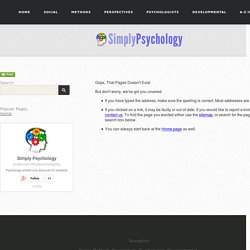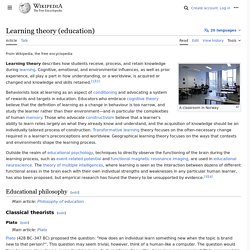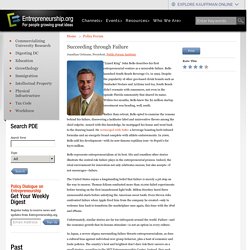7. Learnings from failure
> Curricula
> Students course
Social Learning Theory. Custom Search Oops, That Pages Doesn't Exist But don't worry, we've got you covered.

If you have typed the address, make sure the spelling is correct. Most addresses are case sensitive. If you clicked on a link, it may be faulty or out of date. You can always start back at the Home page as well. Search Popular Pages Home Navigation. Operant conditioning. Learning theory (education)
Methodological behaviorism is based on the theory of only explaining public events, or observable behavior.

B.F. Skinner introduced another type of behaviorism called radical behaviorism, or the conceptual analysis of behavior, which is based on the theory of also explaining private events; particularly, thinking and feelings. Radical behaviorism forms the conceptual piece of behavior analysis. In behavior analysis, learning is the acquisition of a new behavior through conditioning and social learning. The three mains types of conditioning and learning: Classical conditioning, where the behavior becomes a reflex response to an antecedent stimulus.Operant conditioning, where antecedent stimuli results from the consequences that follow the behavior through a reward (reinforcement) or a punishment.Social learning theory, where an observation of behavior is followed by modeling. A multimedia classroom at Islington College, in the United Kingdom About accelerating the learning process.
Learning Theories, Learning Models, Learning Theory Summaries - in Plain English!
Designing for productive failure. Edc_flow_5-12_540.jpg (JPEG Image, 540 × 540 pixels)
Presentation1.jpg (JPEG Image, 960 × 720 pixels)
How do we learn from failure?
HBR Single Player. Scheitern Einleitung: Wird schon schiefgehen. Das Wort „scheitern“ stammt aus dem Milieu der Kaufmänner, Seefahrer und Händler, der Leute also, die die Neuzeit und den Frühkapitalismus aufgebaut haben.

Ihr Denken unterwirft sich nicht mehr dem unabänderlichen Schicksal, sondern dem Verhältnis zwischen Gewinn, Chance und Risiko – ein Wort, das ebenfalls zum Fachjargon der seefahrenden Händler gehört. Doch noch bedeutet Scheitern den Totalverlust des Unternehmens. Ein Schiff, das „scheitert“, hinterlässt auf den Wellen Trümmer, Splitter, Holzscheite – davon leitet sich das Wort ab. Die vom Scheitern bedrohten Unternehmen leben in einer gefährlichen Welt. Sie reagieren darauf mit der Verteilung des Risikos auf viele Kaufleute, mit Nüchternheit, mit Pragmatismus, nicht Furcht, Angst und Schicksalsgläubigkeit.
Succeeding through Failure. Jonathan Ortmans, President, Public Forum Institute “Lizard King” John Bello describes his first entrepreneurial venture as a miserable failure.

Bello launched South Beach Beverage Co. in 1995. Despite the popularity of other geo-based drink brands such as Nantucket Nectars and AriZona iced tea, South Beach didn’t resonate with consumers, not even in the upscale Florida community that shared its name. Within two months, Bello knew the $2 million startup investment was heading, well, south. Rather than retreat, Bello opted to examine the reasons behind his failure, discovering a lackluster label and uninventive flavors among the chief culprits. Bello represents entrepreneurialism at its best. The United States enjoys a longstanding belief that failure is merely a pit stop on the way to success. Unfortunately, similar stories are far too infrequent around the world. In many parts of Europe, would-be entrepreneurs face a double whammy—a stigma for both failure and success.
Strategies for Learning from Failure. The wisdom of learning from failure is incontrovertible.

Yet organizations that do it well are extraordinarily rare. This gap is not due to a lack of commitment to learning. Managers in the vast majority of enterprises that I have studied over the past 20 years—pharmaceutical, financial services, product design, telecommunications, and construction companies; hospitals; and NASA’s space shuttle program, among others—genuinely wanted to help their organizations learn from failures to improve future performance. In some cases they and their teams had devoted many hours to after-action reviews, postmortems, and the like. But time after time I saw that these painstaking efforts led to no real change.
Most executives I’ve talked to believe that failure is bad (of course!). These widely held beliefs are misguided. The Blame Game Failure and fault are virtually inseparable in most households, organizations, and cultures. This concern is based on a false dichotomy. Building a Learning Culture.





